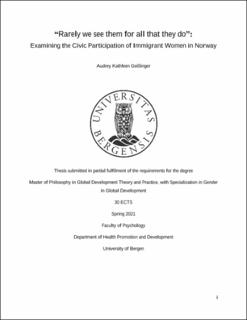| dc.description.abstract | Often immigrant women are assumed to be politically apathetic due to statistically lower rates of involvement in traditional political participation strategies. These measurements neglect the different strategies immigrant women may utilize to influence positive change, such as of civic participation. This thesis explores the strategies and arenas of civic participation immigrant women in Norway use as well as the accessibility and appeal of civic and alternative forms of participation to immigrant women. This was a qualitative, interpretive phenomenological study utilizing six semi-structured interviews. The participants were immigrant women who were involved in the community. Thematic analysis was used to analyze the data and identify codes and themes. This study found that participants were involved in the community in many ways, including participating in NGOs with social justice aims, the neighborhood, in dugnad, and more. Their insights also revealed more informal strategies of participation, such as personal interactions to challenge stereotypes and racism. Experiences of marginalization influence the type and aim of participation. Participants’ involvement was constrained by factors applying particularly to their intersecting identities, such as unfamiliar and exclusionary social codes and organizational power imbalances. As immigrant women, they also felt they were seen as victims and not recognized for their competences. The way in which participants persisted despite barriers to affect change represents a potential for empowerment in civic engagement. Many participants held transformative aims and saw civic participation as a valuable arena to this purpose. However, the conception of active citizenship reveals the normative values inherent in valorizing high levels of participation. Immigrant women in particular are pressured to perform their belonging through acts of contribution to the community without recognition of the barriers they face. Valuable participation is defined by the dominant society, and dominant spaces that reproduce hierarchies and constrain possibilities for truly transformative change are privileged. This study concludes that while civic participation holds a potential for empowerment, it must be evaluated contextually, and the participation of immigrant women in informal arenas should be further explored and uncovered. | |
